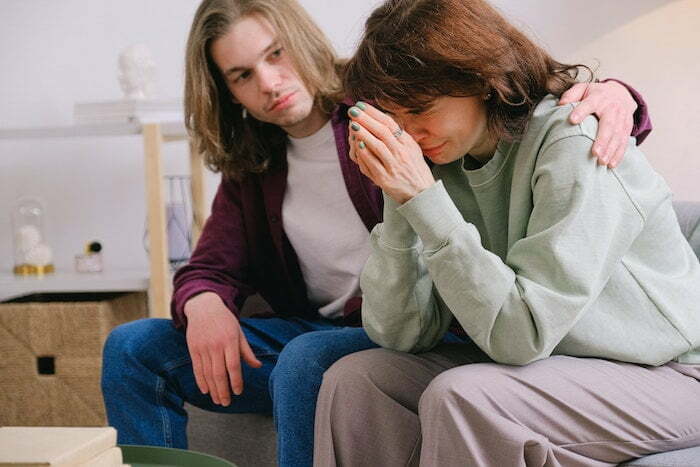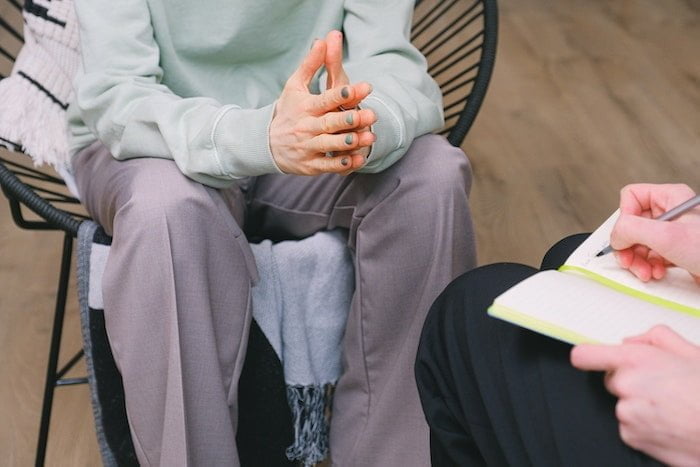Quick links for alcohol and gambling addiction
- What is anxiety?
- What are the signs and symptoms of anxiety?
- Risk factors of anxiety and addiction
- Anxiety and addiction
- Addiction as self-medication for anxiety
- Becoming addicted due to the impact of anxiety
- Anxiety and addiction – Making things worse
- Treatment for anxiety and addiction
- How to get more information about addiction and anxiety
- References for anxiety and addiction
Anxiety is something many people experience, often manifesting as an intense feeling of stress and worry.
People experience anxiety differently, and it can have a range of physical, psychological and emotional effects.
Those who struggle with anxiety are also at a greater risk of developing an addiction, commonly attributed to their desire to self-medicate as a means of soothing the symptoms of their condition.
Treating anxiety can look different for different people, involving both therapeutic and medicinal measures.
If an individual also struggles with substance abuse, these methods must work in tandem with detoxification and addiction-related therapy.
What is anxiety?

Two people sat at a table discussing anxiety
Anxiety is something that many people experience, often involving an overwhelming feeling of worry or panic.
For some, it can occur as a result of dramatic life change, and for others it may impact on a daily basis.
Biologically, anxiety is the body’s natural response to a stressful or dangerous situation.
It floods itself with adrenaline, heightens emotions, and prepares itself to either face the oncoming problem or flee from it.
When an individual feels anxious, their worries feel bigger and scarier, and this can greatly impact their thoughts, emotions and behaviours.
Everyday tasks may seem impossible, or simple processes may become overwhelming.
What are the signs and symptoms of anxiety?

Woman sat behind a sofa suffering from symptoms of anxiety
Different people can experience anxiety in different ways, manifesting through physical changes in their body, [1] chemical changes in their brain, [2] or irrational changes in behaviour.
An individual experiencing anxiety may demonstrate some of the following symptoms:
- Feeling intense dread or panic
- Insomnia or broken sleep
- Physical shaking or trembling
- Headaches or migraines
- Abdominal pain or diarrhoea
- Irritability or sudden changes in mood
- Irregular heart rate
- Profuse sweating
- Dry mouth
- Nausea
- Inability to concentrate
- Avoiding or delaying stressful situations or tasks
- Constantly seeking reassurance from others
- Constantly checking things
Anxiety can strike in a number of ways, and the duration of its symptoms can also vary.
For some, these sensations will pass after a short while, and for others they will be incredibly restrictive, stopping them from continuing with their day-to-day life.
Risk factors of anxiety and addiction

Two women at a table talking about anxiety
As noted above, people are affected differently by anxiety.
Some find it to be a temporary, rare occurrence, whereas others struggle with it every day.
While there is no single reason for why this occurs, there are several contributing factors.
- Genetics – as with other mental health conditions, there is a degree to which the genes an individual inherits contribute to their likelihood of experiencing anxiety
- Trauma – those who have undergone severe trauma in life – as a result of an accident or time in the military, for example – are likely to experience anxiety more regularly
- Illness or poor health – those who have long-term health conditions tend to feel anxiety more frequently, largely due to fearing further pain or discomfort
- Mental health – anxiety can be exacerbated if an individual also suffers from other mental health complications, such as depression or obsessive-compulsive disorder (OCD)
- Exposure to stress – stress, either as a slow build-up or as one large influx, can increase an individual’s susceptibility to anxiety
- Substance use – those who frequently use substances such as alcohol and drugs often find that the effects make them feel more anxious
Anxiety and addiction

Patient talking about anxiety and addiction with a therapist
It is common for those who struggle with anxiety to also find themselves struggling with substance abuse, becoming addicted to substances such as alcohol or drugs.
When working with an individual with anxiety, it is common for social workers to find that they also struggle with some form of addiction. [3]
The relationship between anxiety and addiction is often interconnected.
They can exacerbate one another, and the risk factors which increase the likelihood of anxiety developing also tend to increase the risk of addiction.
Addiction as self-medication for anxiety

Person suffering from anxiety and addiction being comforted by a peer
Those with anxiety often turn to addictive substances as a means of self-medicating the symptoms relating to their condition.
Alcohol and recreational drugs have sedative effects, capable of soothing an individual’s physical, psychological and emotional distress.
Anxiety tends to go undiagnosed in many people, and so they do not receive medicinal treatment to help it.
As a result, they may choose to help themselves, and substances such as alcohol are readily available.
Becoming addicted due to the impact of anxiety

Man suffering from symptoms of anxiety holding his head and speaking with a therapist
When an individual first begins consuming alcohol or drugs as a means of soothing their symptoms, their body is easily sedated. They quickly achieve a high, and they are relaxed.
However, as the substance is used more frequently, the body begins getting used to it
Alcohol, for example, begins to alter the body’s chemical balance, and soon a dependency will begin developing.
As a result of this, an individual quickly finds that they are unable to stop taking the substance.
When they try their body is thrown into an imbalance, triggering uncomfortable and, in the case of alcohol, very dangerous withdrawal symptoms.
Anxiety and addiction – Making things worse

Therapist and patient taking notes and talking about anxiety
Substances like alcohol are depressants, meaning that they have a damaging influence on the thoughts and feelings of those who ingest them.
This means that, while alcohol can make an individual feel good initially, its long-lasting influence is negative, disrupting both their emotional and cognitive stability.
For those with anxiety, this means that substances such as alcohol can exacerbate their symptoms in the long term.
It can heighten stress, produce more violent bodily reactions, and damage mental health.
In response, it is common for an individual to then look to consume more alcohol in an attempt to try and achieve its sedative effects again.
However, thanks to their body’s enhanced tolerance after prolonged exposure, they will need to consume an increasingly larger quantity to do this, pushing them further into the addictive cycle.
Treatment for anxiety and addiction

Peer support group for anxiety and addiction comforting a fellow recoveree
Although sadly anxiety impacts a lot of people, widespread awareness about it means there are several methods available for treating and managing it.
These include:
- Medications designed to ease an individual’s worrying
- Counselling
- Support groups
- Cognitive Behavioural Therapy (CBT), designed to work through how to better deal with anxiety-inducing situations [4]
- Self-help measures
If an individual is struggling with both anxiety and substance abuse, it is essential that the two conditions are treated simultaneously.
The interconnected nature of both problems causes each to exacerbate the other, meaning that effective treatment for one will only be achieved by considering both.
For substance abuse, the initial method of treatment is often detoxification, designed to wean the body from its dependence on a certain substance.
In the case of alcohol, this process can be incredibly dangerous, and should not be attempted without medical assistance.
Within a dedicated facility, an individual’s health can be monitored while they discontinue their substance use, and withdrawal symptoms can be eased with medicinal substitutes if required.
Therapies such as CBT can also be provided to help individuals identify what situations and emotions provoke them to abuse a certain substance. With anxiety sufferers, these tend to be the same scenarios that induce anxiousness, and the therapy’s goal is to help develop alternative ways of reacting to them.
How to get more information about addiction and anxiety

Two people holding hands and discussing both addiction and anxiety
If you or someone you know is struggling with anxiety, it is important to seek medical help.
Speak to a GP to discuss the details of your situation and find out what support is available.
It is also essential to seek help if someone with anxiety is also struggling with substance abuse.
This can be very dangerous, so speak to a GP or the OK Rehab team to see what local treatment methods are most appropriate.
References for anxiety and addiction
- https://www.mind.org.uk/information-support/types-of-mental-health-problems/anxiety-and-panic-attacks/symptoms/
- https://ncbi.nlm.nih.gov/pmc/articles/PMC3656338/
- https://www.ncbi.nlm.nih.gov/pmc/articles/PMC3775646/
- https://www.nimh.nih.gov/health/topics/anxiety-disorders/






